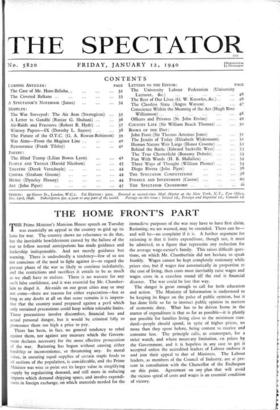THE HOME FRONT'S PART T HE Prime Minister's Mansion House speech
on Tuesday was essentially an appeal to the country to gird up its loins for war. The country shows no reluctance to do that, but the inevitable bewilderment caused by the failure of the war to follow normal anticipations has made guidance and leadership indispensable. And not merely guidance but warning. There is undoubtedly a tendency—few of us are not conscious of the need to fight against it—to regard the present phase of the war as likely to continue indefinitely, and the restrictions and sacrifices it entails to be as much as we shall have to endure. There is no warrant for any such false confidence, and it was essential for Mr. Chamber- lain to dispel it. Air-raids on our great cities may or may not come—there are reasons for either expectation—but as long as any doubt at all on that score remains it is impera- tive that the country stand prepared against a peril which only sustained precautions could keep within tolerable limits. Those precautions involve discomfort, financial loss and actual personal danger, but it would be criminal folly to pronounce them too high a price to pay.
There has been, in fact, no general tendency to rebel against them, nor against any measure which the Govern- ment declares necessary for the more effective prosecution of the war. Rationing has begun without causing either hardship or inconvenience, or threatening any. Its moral value, in ensuring equal supplies of certain staple foods to all sections of the population, is considerable, and the Prime Minister was wise to point out its larger value in simplifying supply by regularising demand, and still more in reducing imports which demand shipping space, and involve expendi- tures in foreign exchange, on which materials needed for the immediote purposes of the war may have to have first claim. Rationing, we are warned, may be extended. There can be— and will be—no complaint if it is. A further argument for rationing is that it limits expenditure, though not, it must be admitted, to a figure that represents any reduction for the average wage-earner's family. This raises difficult ques- tions, on which Mr. Chamberlain did not hesitate to speak frankly. Wages cannot be kept completely stationary while prices rise, but if wages rise automatically in proportion to the cost of living, then costs must inevitably raise wages and wages costs in a ceaseless round till the end is financial disaster. The war could be lost that way.
The danger is great enough to call for both education and action. The Ministry of Information is understood to be keeping its finger on the pulse of public opinion, but it has done little so far to instruct public opinion in matters of economic duty. What has to be driven home in the matter of expenditure is that so far as possible—it is plainly not possible for families living close to the minimum stan- dard—people should spend, in spite of higher prices, no more than they spent before, being content to receive and consume less. The principle calls, as counterpart, for a strict watch, and where necessary limitation, on prices by the Government, and it is hopeless in any case to get it accepted unless the accredited leaders of Labour endorse it and join their appeal to that of Ministers. The Labour leaders, as members of the Council of Industry, are at pre- sent in consultation with the Chancellor of the Exchequer on this point. Agreement on any plan that will avoid the vicious spiral of costs and wages is an essential condition of victory.


































